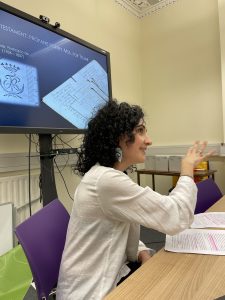This post is part of our Research Initiation Scheme for 2023-2024.
On Friday 8th March, Noelia López-Souto (Universidad de La Laguna, Tenerife) delivered a seminar on her research into Salamancan poet José Iglesias de la Casa, focusing on his life and poetry in 18th century Spain.

To begin her presentation, Dr López-Souto presented us with a portrait of José Iglesias de la Casa, and highlighted how elements included in this portrait represented his life as a priest and poet. However, his dual role of priest and poet posed a problem, as there was sometimes a tension between his religious life and the content of his poetry including, for example, his use of satire. Writing in the 18th century, at a time which fell between the Golden Age and Romantic period of literature, his work is part of the School of Salamanca, an important Spanish literary group with a new poetry influenced not only by the European Rococo movement but also by traditional Spanish poetry and classical models.
Dr López-Souto highlighted how many of his works were subject to posthumous editing, leading to the modification of controversial sections of the original texts, and their division into volumes to facilitate publishing. Despite this, his Poesías Póstumas (1793) were widely successful, and were included in various collections of classical Spanish poetry. However, these works were later silenced and removed from these publications. Dr López-Souto then explained how she has released a new manuscript with poems by Iglesias. Her research aims to recover the poet’s lost works and make them more widely available.
Iglesias’ works are particularly interesting due to the manipulation or censorship of their content. Of 72 original poems in the manuscript, only 57 were included in Poesías Póstumas without changes. The first volume of Poesías Póstumas focused on Pastoral poetry, which centred on sensuality, and the second featured his satirical works, which included use of wit and references to contemporary reality. The poet’s use of third person narration was considered scandalous at the time, particularly for a priest, and was interpreted as a means to avoid confusion between author and narrator.
Finally, Dr López-Souto illustrated how José Iglesias de la Casa directly reflected his own life and experiences through poetry, with the use of engravings to illustrate publications forming this link between literature and life. The references to the author himself in the text further reinforce this mirroring of reality, and serve as a representation of his life and personal opinions. What Dr López-Souto refers to as the ‘transformative and fresh attitude’ of José Iglesias de la Casa, which unfortunately never entered into the literary canon of his time, created a dialogue with the reader and encouraged reflection on social ideologies. Dr López-Souto also underlined how the poet’s possible allusions to homosexuality within his works were also likely a reflection of his personal reality. Allusions to sexuality that fell outside of the socially accepted hetero-normativity of 18th century Spain sparked controversy, and were extremely uncommon and scandalous for both the era and for a man of his social standing, which could have influenced the arbitrary censorship of many of the poems.
Dr López-Souto’s seminar was a captivating and insightful glimpse into the life and works of a poet I had never encountered before. In our modern society where editing and manipulation of content is increasingly present, it was fascinating to learn about how research can contribute to the recovery of poetry that would otherwise have been lost to time.
Report by Sara Steele, final-year undergraduate in French and Spanish
Editor’s note: Noelia López-Souto was a Visiting Scholar in the School of Arts, English and Languages during semester 2 of 2023-2024, working on 18th-century book history with Dr Gabriel Sánchez Espinosa.